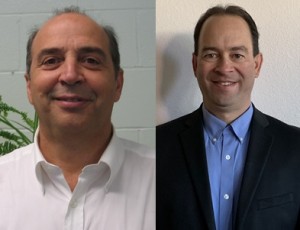SPARC Webinar: July 8
BIPASS: Battery with Integrated Processing and Sensing System
with Prof. Otto Gregory, Distinguished Engineering Professor
of Chemical Engineering at the University of Rhode Island and Dr. Brian Berland, Chief Technology Officer, ITN Energy Systems
The slides and video presentation of the July 8th webinar is now available online!
The second webinar of the SPARC (Seminars to Promote ALERT Research and Collaboration) Webinar series will be held on July 8th from 11:30am – 12:00pm EST. More information on the presentation can be found below:
Title: BIPASS: Battery with Integrated Processing and Sensing System
Presenters: Prof. Otto Gregory, Distinguished Engineering Professor of Chemical Engineering at the University of Rhode Island and Dr. Brian Berland, Chief Technology Officer, ITN Energy Systems
Abstract:
There is a growing need among military, first responders, and law enforcement for a continuous monitoring system that can detect explosives, toxic gases, and even narcotics in the vapor phase at trace levels. Many of these compounds go largely undetected in densely populated venues and other areas of interest. Currently, no electronic trace detection system exists that is capable of continuously monitoring threats in a lightweight, portable package. Recently, a battery was developed for an integrated processing and sensing system (BIPASS). It aims to combine ultrasensitive, thin film sensors developed at the University of Rhode Island (URI) with ITN’s ultra-thin solid-state lithium battery (SSLB) such that the power module, sensor, signal processing, and telemetry electronics can be integrated into a single package with a total thickness <250 µm.
In order to implement URI’s electronic trace detection (ETD) system in the BIPASS package, it had to be fabricated on the same YSZ substrate and integrated with the SSLB stack. Using ultrathin YSZ substrates reduces the thermal mass of the sensing platform improving sensor sensitivity and response times. Additionally, these substrates possess highly localized heating in the “z” direction, since their thermal properties are highly anisotropic, thus, the heat remains in the catalyst area and does not dissipate throughout the rest of the sensor platform resulting in a dramatic decrease in the operating temperature required for detection (500°C to <175°C) and in power consumption (4W to <400mW).
BIPASS represents a new class of ultra-thin, flexible, battery control and sensor system circuits with thickness <250 µm capable of efficient and compact deployment on portable platforms, allowing implementation onboard small drones, wearables, and other volume/weight-sensitive platforms.
Speaker Bios:
Otto J. Gregory, PhD. is currently Distinguished Engineering Professor in the Department of Chemical Engineering at the University of Rhode Island and Director of the URI Sensors and Surface Technology Partnership for Research and Education. He received B.S. and M.S. degrees in Chemical Engineering from the University of Rhode Island in 1975 and 1977, respectively and a Ph.D. degree in Engineering from Brown University in 1983. His research has focused on sensors for harsh environments for the past 40 years and he has authored/co-authored more than 110 peer reviewed journal articles, which have provided the background for 42 US Patents. His research is currently funded by the Department of Homeland Security (DHS), The Flex-Tech Alliance (DOD), Pratt and Whitney Aircraft Engines, RI Innovations and private industry.
Brian Berland, PhD. is the Chief Science Officer for ITN Energy Systems. In this role, he directs both technology and business development activities with a focus on moving technologies from the lab to commercialization. Over the last twenty years, he has led research and development activities in flexible electrochromic and low-e window films, flexible lithium solid state batteries, redox flow batteries, alternate energy generation and storage materials, environmental barrier coatings, as well as gas and liquid separation membranes. In his time at ITN, he has been an integral member of a team to successfully bid and execute over $30M in R&D programs with corporate and government partners, including leading teams commercializing ITN’s SSLB with leading worldwide corporate partners. He has been active in all aspects of product development for these technologies including cost-modeling, development of strategic partnerships, and definition of product performance requirements/market identification to support successful commercial transition and scale-up. Prior to joining ITN Energy Systems, Dr. Berland was a postdoctoral research associate at the University of Colorado in the labs of Professor Steven George, a world leader in ALD chemistry. He holds a BS in Chemistry from Carleton College and a Ph.D. in Chemistry from the University of Colorado.
If you are interested in attending or have any questions, please reach out to Tiffany Lam at [email protected] for more information.


There are currently no comments.
The comments are closed.